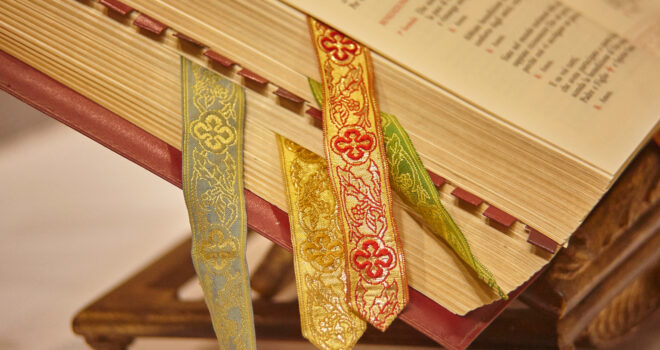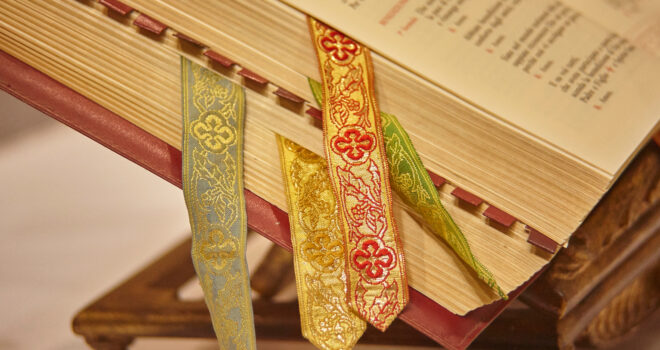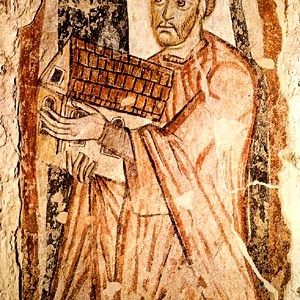Arguably, the most important prayer for the Catholic priest is the Divine Office.
This should cause a tremor to quake those pious souls among us a bit: “Hold on… It’s the Mass, right?”
Undoubtedly, yes, the Mass is the most exalted prayer, “the source and summit of the whole Christian life” (Lumen Gentium, §11) so is of utmost importance to the life of those souls wed to Christ and the Church, those priests aspiring to holiness. The Mass is the crown jewel of the Church’s liturgy and assisting in it, let alone offering it, is the greatest act of worship (worship being man’s greatest act, ST, II-II, Q. 81, a. 6) any person can partake in… yet offering Mass daily is (currently) not required under pain of sin for the cleric.
But praying the Divine Office daily is required.
And this isn’t isolated to some small group. This comes from the juridical book of books for Roman Catholics: The Code of Canon Law.
Canon Law mandates this: “Priests and deacons aspiring to the presbyterate are obliged to carry out the liturgy of the hours daily according to the proper and approved liturgical books” (Canon 276, §2, n. 3).
This may seem ho-hum, droll legalistic language (it is), but the precision of the wording “are obliged to carry out” is better comprehended when juxtaposed with what immediately follows: the obligation to celibacy. Within its book of Church Law, for the Latin Church, the Church identically legislates the obligation to her clerics to pray the office daily with just as much force as she commands them to be perpetually continent (Can. 277 §1).
Search it over as many times as you like, but priests are never strictly legally “obliged” to offer the Holy Sacrifice of the Mass on a daily basis. Even on Sundays, if you want to be technical.
But why?
And now we find this article’s point: We Catholics have been missing the purpose of what the Divine Office is.
So… what is the Divine Office?
Although Pope Pius XII’s more technical definition of it may be more proper (cf. Mediator Dei, §142), I find that a more childlike one is often more helpful; to understand what grace is, starting with the definition of it as “God’s life in us” is often more fruitful than the richer, more robust technical definition of “a supernatural quality inhering in the soul which makes us partakers of the divine nature in a real and formal but accidental manner”. So let us begin with this: The Divine Office, like the Mass, is the Church’s prayer. To understand what this means, let us turn to that saintly 19th century Benedictine abbot, Dom Prosper Gueranger–the titan of liturgical reform who started the renaissance of love for the liturgy–and read the best description I have found of what prayer is:
“Prayer is man’s richest boon. It is his light, his nourishment, and his very life, for it brings him into communication with God, who is light [John 8:12], nourishment [John 6:35], and life [John 14:6]… in the holy Church that [Christ’s] divine Spirit dwells… Ever since that day of Pentecost, He has dwelt in this His favoured bride. He is the principle of everything that is in her… prompts her prayers, her desires, her canticles of praise, her enthusiasm, and even her mourning. Hence her prayer is as uninterrupted as her existence. Day and night is her voice sounding sweetly in the ear of her divine Spouse, and her words are ever finding a welcome in His Heart… Happy, then, is he who prays with the Church, and unites his own petitions with those of this bride, who is so dear to her Lord that He gives her all she asks.” (The Liturgical Year, Volume I: Advent, General Preface)
And this understanding of prayer lets us see how the Divine Office differs from the Mass.
Simply put, the Divine Office is the continual singing of the beloved to her Divine Lover so perfect as to be prayerful worship.
At its roots, it is that and purely that.
In the Old Testament, this was principally done in the books of poetry, The Book of Psalms and The Canticle of Canticles. In the New, no book consisting purely of poetry exists. Bits and pieces are selected from various books, but there is no singular book of songs or poems in the New Testament like Psalms or The Canticle.
Instead, in their places, the people of God have those Old Testament hymns woven into what we call the Divine Office, and the New Israel carries on the life of praise of the Nation of the People of God.
The Divine Office, therefore, is our partaking, our forwarding of salvation history by living out the New Testament rendition of the Psalms and the Canticle of Canticles by our adopting of these poems into our own lives. It is especially–and most fittingly–fulfilled by priests and religious, the living models, witnesses, and vowed spouses of Christ among us.
Surprisingly, Canon Law does have its mystical bits, and its line on The Liturgy of the Hours can perk up any canon lawyer’s spirits with these sublime lines: “Fulfilling the priestly function of Christ, the Church celebrates the liturgy of the hours. In the liturgy of the hours, the Church, hearing God speaking to his people and recalling the mystery of salvation, praises him without ceasing by song and prayer and intercedes for the salvation of the whole world” (Canon 1173). Salvation history is forwarded by participation in the Divine Office and continues the work laid down by the Scriptures of giving praise to God through the exercise of our harmonized bodies and souls, the original work given to Adam in the Garden.
With the incarnational coming of Christ, so it seems, the Book of Psalms and Canticle of Canticles need no New Testament counterpart in a book: they are to be lived. They are to find their fulfillment in Jesus Christ, and the members of His Mystical Body called to become ever more conformed to Him. The two books of Psalms and The Canticle recount the soul speaking directly to God, and so the Church has adopted (and mandated) their form into the daily life of those who have wed themselves mystically to Christ through the Divine Office.
The Psalms are the hymns and cries of the emboldened lover to the divine lover. The Psalms are where the soul can put her soul the closest she can dare return to edenic nakedness before the Almighty and show herself as she is, with all her thoughts, emotions, and violent swings of passion to the Divine; the Canticle is the encounter between the beloved (a figure of Israel) and the lover (a figure of God), and the dialogue and drama that results from this tremendous love, and recounts the anticipation and realization of that encounter with God wherever it occurs, and the lamentation of it when absent.
What better words could be found to express the Church’s love for her Most Holy Spouse! What could be greater than weaving the already supernaturally inspired book of poems of love given to her by the beloved to please Him, written into the heart-to-heart dialogue imitating The Canticle of Canticles, permeated with the lives of the saints—those victorious lovers of God—and imbued with the pleas of the Church for her earthly members’ daily needs?
Indeed, the Holy Sacrifice of the Mass is the most splendid jewel of the liturgy, but the Divine Office is that eternal golden band that wraps us around the finger of God in an everlasting circle and that holds the Mass in its place and gives it a setting for which to best reflect its infinite beauty. Just as the lover continually desires to speak to his beloved throughout the entirety of the day, the Divine Office is how the soul speaks to Christ in the voice of the bride, the Church, throughout the course of the day, living out those verse of the Psalms that say in Psalm 118 “At midnight I rise to praise you… [and] seven times a day I have given praise to thee” (Psalm 118:62, 64, Douay-Rheims translation). Sacrosanctum Concilium, in §84, repeats this thought: “It is truly the voice of the bride addressed to her bridegroom; It is the very prayer which Christ Himself, together with His body, addresses to the Father.”
The Mass is the greatest sacrificial act of the Greatest Priest, but–just as the entire life of Christ was a priestly offering that had true merit and redemption even though every single moment was not the Sacrifice of Calvary–so too does the Divine Office continue the priestly mission of the Church. The Catechism expounds that “The Liturgy of the Hours, which is like an extension of the Eucharistic celebration, does not exclude but rather in a complementary way calls forth the various devotions of the People of God, especially adoration and worship of the Blessed Sacrament” (CCC, 1178) the Blessed Sacrament being the place where our souls realize, consummate that encounter with God. Just as the most brilliant crescendo of a symphonic piece loses some of its grandeur to the listener if heard isolated out of context from its preludes and following movements, so too does the Mass lose a bit of its grandeur to its participants if isolated and separated from the context of the Divine Office that precedes and follows it.
That is why the Divine Office is mandated, that is why it is done: for the good of our own souls and the perfection of our union with God, most especially in the reception of Him in the Most Blessed Sacrament of the Altar.
Just as priests in the Roman Church cannot now marry after receiving Holy Orders, so too must they offer the Divine Office daily because the Catholic priest is wed to the Divine Office as a sign of his vows to God. As a priest whom I greatly respect once told me, the celebration of Mass is akin to the marital embrace of a wedded couple, while the recitation of the Divine Office is likened to the shared daily life of love, lived in the presence of the beloved.
Lovingly stitched together by the Church through the gentle and divinely guided inspiration of the Holy Spirit, know that recitation of the Divine Office is the living out of the Book of Psalms and the Canticle of Canticles in our daily lives. As Pope Benedict XVI once said, “the place where [the Church] is fully experienced as a Church is in the liturgy: it is the act in which we believe that God enters into our reality and we can meet Him, we can touch Him… He comes to us, and we are enlightened by Him.” (General Audience, 10/3/2012); the mandated recitation for the cleric of the liturgy of the Divine Office seeks to do this very thing: to form that priestly soul to be habitually living in the presence of God through continual contact with Him.
This is why it is arguably more important: it is the entirety of the day lived with God–not a single moment–which enrichens and prepares the soul for the reception of Him when He comes to us in the Most Blessed Sacrament. Every recitation of the Divine Office is the claiming of our inheritance as citizens–as heirs!– of the New Jerusalem, the Kingdom of Heaven on earth, our most dear Holy Mother Church.
This is why the Second Vatican Council was right to emphasize the Divine Office and encourage its recitation by the laity too. Through the Divine Office, each time we pray it, we approach Eden and walk with the God in the garden of our souls, as we answer God’s call to His beloved that is each one of us in the Canticle of Canticles: “Thou that dwellest in the gardens…make me hear thy voice” (Canticle of Canticles, 8:13).
✠












